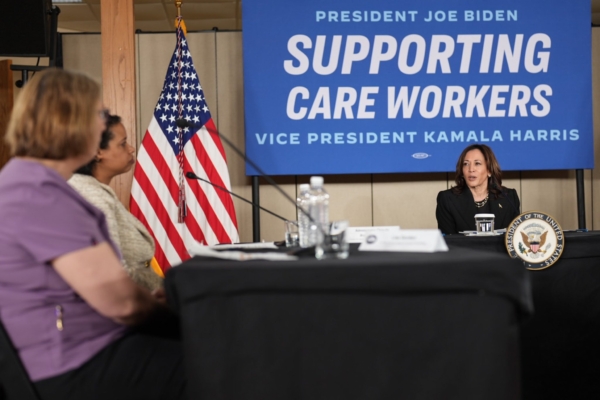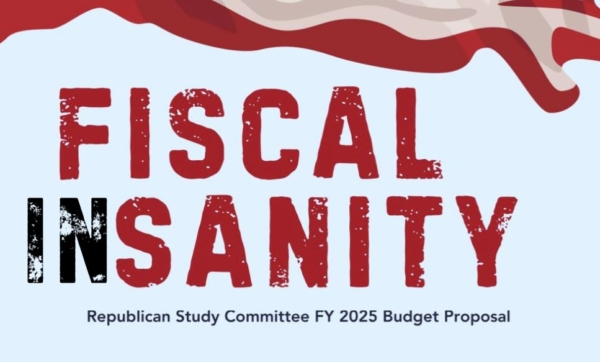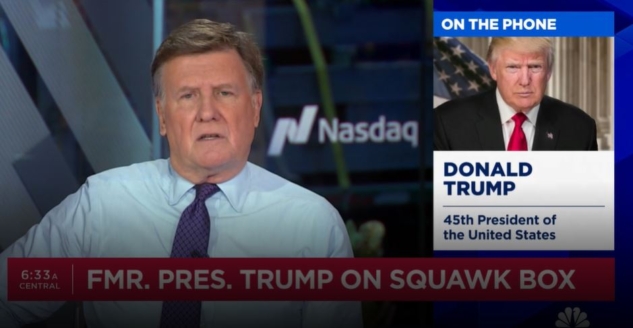House GOP Appropriators Announce 10% Cut in Labor/HHS Spending

House Republicans once again are showing where their true priorities lie. Appropriations committee chair Tom Cole (R-OK) announced the GOP’s topline numbers for fiscal year 2025 — including at least a 10% cut in funding for Labor/HHS (Health & Human Services). That could mean agencies like the Social Security Administration (SSA) and Center for Medicare & Medicaid Services (CMS) would endure a huge spending cut, while Republican appropriators propose to boost military spending by 1%.
“As we have said many times, a budget is a moral document. But where is the morality in slashing funding for agencies that service our nation’s most vulnerable citizens — especially seniors who depend on their benefits for financial and health security?” said NCPSSM President and CEO Max Richtman. At the same time, of course, the House Republican Study Committee proposed making the Trump/GOP tax cuts permanent – a generous gift to their wealthy donors and big corporations.
The appropriations plan announced today dishonors the debt limit deal struck by White House, Senate, and House negotiators last year, in that it casts aside “side deals” that would have provided more revenue for appropriators to work with. Ranking Appropriations Committee member Rosa DeLauro (D-CT) scolded Republicans for “leaving on the table at least $75 billion in investments that (American) families depend on.”
NCPSSM Senior Legislative Representative Maria Freese notes that Cole’s announcement does not specify which agencies and programs under the Labor/HHS umbrella would be cut – and by how much. But she points out, “Even though we don’t know how the individual pie slices will turn out, the overall pie is a lot smaller.”
Freese says that, in addition to SSA and CMS funding, some Older Americans Act programs could be affected by a 10% in Labor/HHS appropriations, including the popular Meals on Wheels program. For his part, the only regret that Chairman Cole voiced is that he wishes he could have come up with more funding for Defense:
“If there’s ways along the way that we can do some things to help defense, I certainly intend to do them, but I don’t know what they are yet.” – Rep. Tom Cole (R-OK), Chairman, House Appropriations Committee
The House Appropriations committee is scheduled to vote on the actual numbers next week. The Senate, meanwhile, is working on its own appropriations package, which likely will look very different than the working House version. Senate Appropriations Committee vice-chair, Senator Susan Collins (R-ME), would like to boost defense spending even more; Appropriations Committee member Sen. Patty Murray (D-WA) insists that defense and non-defense spending be boosted equally.
The ultimate compromise between the two chambers, when it finally comes, likely will be less drastic than the current House GOP appropriations scheme announced today. “Hopefully, this 10% cut to Labor/HHS won’t happen, and shouldn’t happen,” said Freese. “But in this very crucial election year, it does show you what direction House Republicans want to take us.”
New Biden Administration Rules Aim to Boost Nursing Home Care & Caregivers



The Biden administration is out with historic, new rules designed to improve elder care — and protect caregivers. The first rule, issued last week, requires all nursing homes to provide 3.5 hours of daily care per patient by certified nurses’ aides or nurses. Up to now, there has been no minimum federal staffing requirement. Staffing levels were regulated only by the states, insufficiently in many cases.
“We do think this could make a significant difference in the lives of our loved ones in nursing homes,” says Anne Montgomery, NCPSSM’s senior health care expert. “It means that there is a uniform standard that it is meant to protect residents wherever they may be — across the country.”
U.S. nursing homes remain beset by patient care problems in the aftermath of the COVID pandemic, when more than 200,000 residents and staff perished. In February, the New York Times reported that “infection control lapses, severe staffing shortages and lowering vaccination rates have continued to plague many facilities beyond the pandemic.”
Montgomery says that the administration’s new minimum staffing rule should help boost patient care and working conditions — and hopefully, morale, too — for professional caregivers in nursing homes. She says that caregiver turnover rates in the nation’s nursing homes runs from 50-100% per year, contributing to a nationwide staff shortage.



“Constant understaffing requires nursing aides to care for as many as 20-30 residents at a time, which is not doable in any kind of quality way,” says Montgomery. She points out that the 3.5 hour per patient daily staffing requirement is below the 4.1 hours that federal studies have found to be the minimum to ensure quality care, but that the new rule is a step in the right direction and probably the best the Biden administration reasonably could do at this time.
A New Rule for Home and Community Based Caregiving
HHS released a second rule last week aimed at channeling more federal money toward professional caregiver pay. The rule affects Home and Community Based Services (HCBS), which is paid for by Medicaid on a state-by-state basis. Under the new rule, 80% of the funding that state Medicaid programs pay HCBS providers must go directly to direct caregivers’ salaries.



Vice President Harris with caregivers in Wisconsin last week
Montgomery says that up to now too much of that funding has gone toward providers’ administrative or “overhead” expenses — or skimmed off the top by for-profit operators. “The new rule will bolster direct care workers because they are underpaid and under-appreciated. We’re glad that the federal government has taken notice — and is taking action to improve their lot.”
“It is about time that we start to recognize your value and pay you accordingly and give you the structure and support that you deserve,” Vice President Kamala Harris told a small group of care workers in Wisconsin, shortly after announcing the new rule.
Wisconsin’s MAGA Senate Candidate in Hot Water again re. Nursing Homes



MAGA Senate Candidate Eric Hovde (from campaign ad)
We blogged a couple of weeks ago about Wisconsin GOP Senate candidate Erik Hovde’s head-scratching comments suggesting that seniors in nursing homes don’t have the mental capacity to vote. Now, the New York Times has reported, Hovde is financially entangled with a nursing home that is being sued for mistreating patients:
The bank he leads, Utah-based Sunwest, last month was named as a co-defendant in a California lawsuit that accuses a senior living facility partly owned by the bank of elder abuse, negligence and wrongful death. – NY Times, 4/20/24
The story added a new dimension to the public’s understanding of Hovde, a Trump-endorsed MAGA candidate who is trying to unseat incumbent Democratic Senator Tammy Baldwin. (NCPSSM’s PAC endorsed Baldwin in March.) On Tuesday, NCPSSM president and CEO Max Richtman criticized Hovde as being out of touch with older voters… in a press call organized by Wisconsin’s Democratic party:
“Eric Hovde is obviously very comfortable among wealthy bankers, but not so much with the people of Wisconsin — and certainly not with the state’s seniors. The contrast with Senator Baldwin could not be clearer.” – Max Richtman, NCPSSM President & CEO, 4/23/24
According to Wisconsin Democratic Party chair Ben Wilker, Hovde has managed to insult not only seniors — but several other constituencies. Wilker quotes Hovde as saying that farmers spend all their time driving around on tractors and don’t do real physical labor; that young Wisconsinites lack a work ethic and are “so stupid”; and that people struggling with obesity should pay more for their health care. Five months before the general election, Hovde is certainly off to an auspicious start!
Read on… here is our original blog post from 4/11/24::::



Seniors’ advocates and their political allies are criticizing recent comments by Wisconsin U.S. Senate candidate Eric Hovde suggesting that nursing home residents can’t – or shouldn’t – vote. Hovde, who is running to unseat incumbent Senator Tammy Baldwin (D-WI), told Fox News’ Guy Benson:::
“We had nursing homes where you had 100 percent voting… Well, if you’re in a nursing home, you only have a five, six-month life expectancy. Almost nobody in a nursing home is in a point to vote. And you had children, adult children showing up saying, ‘Who voted for my 85 or 90-year-old father or mother?’” – GOP Senate candidate Eric Hovde
These comments by the Trump-endorsed, MAGA Republican candidate drew sharp rebukes as blatantly ageist and fact-free. “Hovde said that people living in nursing homes usually die after a few months,” Senator Baldwin’s campaign responded. “Everyone deserves the freedom to vote, so they can make their voices heard in our elections. But Eric Hovde wants to take that away for seniors living in nursing homes.”
NCPSSM, which has endorsed Baldwin’ re-election bid, blasted Hovde’s comments. “Senators are supposed to represent ALL of their voters, and it is a total insult to the basic dignity of Wisconsin’s seniors to suggest that they are too old to vote,” said Luke Warren, director of the NCPSSM political action committee (PAC). “Hovde should be celebrating high voter turnout among nursing home residents, not griping about it.”
Anne Montgomery, NCPSSM’s senior health policy expert, added, “Hovde is basically suggesting that people in nursing homes are unworthy of voting, and that they are all about to die, which is not true.” Montgomery corrected several false or misleading arguments in Hovde’s comments:::
*The average life expectancy of nursing home residents is years, not months.
*There’s ZERO evidence that fraudulent ballots were cast in Wisconsin nursing homes in 2020.
*Nursing home residents, on average, are trending younger. The percentage of patients under 65 years of age in nursing homes grew from 10% in 2000 to 16% in 2017.
The Independent offered some additional fact-checking, indicating that voter participation in Wisconsin nursing homes was nowhere near “100%” in 2020, as Hovde claimed. “A review… by the Wisconsin State Journal found just one nursing home in the state had a 100% voter turnout. (It had just 12 registered voters).” Other facilities ranged from 42-91%, the paper reported.
Hovde’s remarks are not random for a MAGA candidate; they are part of Trump’s larger (and false) narrative about the 2020 election being “rigged.” (Hovde disagrees that the election was “stolen,” but said “things happened in that election that were very troublesome.”) Wisconsin was crucial to Joe Biden’s electoral victory in 2020, and the MAGA movement can’t abide that he won the state fairly, claiming that “thousands of crooked votes” came out of nursing homes in Wisconsin — a falsehood that has been completely discredited.
“Instead of trying to disenfranchise seniors living in nursing homes,” NCPSSM’s Anne Montgomery says, “We should be continuing to try to make it easier for nursing home residents to vote. They are just as entitled to participate in our democratic system as everyone else.”
Montgomery points out that lawmakers over the years have tried to reduce barriers to voting access for this population, including mail balloting and accommodations for people with disabilities at polling places. Montgomery cited the Help America Vote Act of 2002 — and a series of GAO reports highlighted by then-Senator and Baldwin’s predecessor, Herb Kohl (D-WI), acknowledging efforts to facilitate voting access and calling for further improvements.
When Badger State seniors cast ballots in 2024, they will have to take stock of the two Senate candidates, MAGA Republican Eric Hovde vs. Democrat Tammy Baldwin, who NCPSSM praised as a “champion of Wisconsin seniors.” As PAC director Luke Warren says, “It takes little imagination to picture how a ‘Senator Hovde’ would treat older constituents if he were in office. He has praised plans to gut Medicare and supports cutting Social Security. These latest comments are a stark reminder of the stakes in November for Wisconsin seniors.”
Listen to our podcast about ageism in culture and politics: Part 1 and Part 2 with expert S. Jay Olshanksy.
MAGA Wisconsin Senate Candidate Rebuked for Nursing Home Comments



Seniors’ advocates and their political allies are criticizing recent comments by Wisconsin U.S. Senate candidate Eric Hovde suggesting that nursing home residents can’t – or shouldn’t – vote. Hovde, who is running to unseat incumbent Senator Tammy Baldwin (D-WI), told Fox News’ Guy Benson:::
“We had nursing homes where you had 100 percent voting… Well, if you’re in a nursing home, you only have a five, six-month life expectancy. Almost nobody in a nursing home is in a point to vote. And you had children, adult children showing up saying, ‘Who voted for my 85 or 90-year-old father or mother?’” – GOP Senate candidate Eric Hovde
These comments by the Trump-endorsed, MAGA Republican candidate drew sharp rebukes as blatantly ageist and fact-free. “Hovde said that people living in nursing homes usually die after a few months,” Senator Baldwin’s campaign responded. “Everyone deserves the freedom to vote, so they can make their voices heard in our elections. But Eric Hovde wants to take that away for seniors living in nursing homes.”
NCPSSM, which has endorsed Baldwin’ re-election bid, blasted Hovde’s comments. “Senators are supposed to represent ALL of their voters, and it is a total insult to the basic dignity of Wisconsin’s seniors to suggest that they are too old to vote,” said Luke Warren, director of the NCPSSM political action committee (PAC). “Hovde should be celebrating high voter turnout among nursing home residents, not griping about it.”
Anne Montgomery, NCPSSM’s senior health policy expert, added, “Hovde is basically suggesting that people in nursing homes are unworthy of voting, and that they are all about to die, which is not true.” Montgomery corrected several false or misleading arguments in Hovde’s comments:::
*The average life expectancy of nursing home residents is years, not months.
*There’s ZERO evidence that fraudulent ballots were cast in Wisconsin nursing homes in 2020.
*Nursing home residents, on average, are trending younger. The percentage of patients under 65 years of age in nursing homes grew from 10% in 2000 to 16% in 2017.
The Independent offered some additional fact-checking, indicating that voter participation in Wisconsin nursing homes was nowhere near “100%” in 2020, as Hovde claimed. “A review… by the Wisconsin State Journal found just one nursing home in the state had a 100% voter turnout. (It had just 12 registered voters).” Other facilities ranged from 42-91%, the paper reported.
Hovde’s remarks are not random for a MAGA candidate; they are part of Trump’s larger (and false) narrative about the 2020 election being “rigged.” (Hovde disagrees that the election was “stolen,” but said “things happened in that election that were very troublesome.”) Wisconsin was crucial to Joe Biden’s electoral victory in 2020, and the MAGA movement can’t abide that he won the state fairly, claiming that “thousands of crooked votes” came out of nursing homes in Wisconsin — a falsehood that has been completely discredited.
“Instead of trying to disenfranchise seniors living in nursing homes,” NCPSSM’s Anne Montgomery says, “We should be continuing to try to make it easier for nursing home residents to vote. They are just as entitled to participate in our democratic system as everyone else.”
Montgomery points out that lawmakers over the years have tried to reduce barriers to voting access for this population, including mail balloting and accommodations for people with disabilities at polling places. Montgomery cited the Help America Vote Act of 2002 — and a series of GAO reports highlighted by then-Senator and Baldwin’s predecessor, Herb Kohl (D-WI), acknowledging efforts to facilitate voting access and calling for further improvements.
When Badger State seniors cast ballots in 2024, they will have to take stock of the two Senate candidates, MAGA Republican Eric Hovde vs. Democrat Tammy Baldwin, who NCPSSM praised as a “champion of Wisconsin seniors.” As PAC director Luke Warren says, “It takes little imagination to picture how a ‘Senator Hovde’ would treat older constituents if he were in office. He has praised plans to gut Medicare and supports cutting Social Security. These latest comments are a stark reminder of the stakes in November for Wisconsin seniors.”
Listen to our podcast about ageism in culture and politics: Part 1 and Part 2 with expert S. Jay Olshanksy.
Republican Study Committee Budget Cuts Earned Benefits; Keeps Trump Tax Cuts



For solid clues as to what the Republicans would do to Americans’ earned benefits if they maintain power in the House and recapture the Senate and/or the White House, look no further than the House Republican Study Committee (RSC) 2025 budget blueprint. For the second year in a row, the RSC proposes cutting Social Security and Medicare. Rep. Brendan Boyle, Ranking member of the House Budget committee, estimated at a hearing today that these cuts amount to $1.5 trillion for Social Security and $1 trillion for Medicare.
On the Social Security side, the RSC calls for raising the full Social Security retirement age from its current level of 67 (for anyone born in 1960 or later) to an unspecified older age. “Raising the retirement age is a huge benefit cut,” explains NCPSSM President and CEO, Max Richtman, “because you’d be receiving less money as a beneficiary during your lifetime.”
Republicans say that because (on average) people are living longer, they should be forced to work longer before collecting full Social Security benefits. They neglect to mention that workers in physically demanding jobs cannot always work into their late 60s — or that living longer means having to stretch what may be scant retirement savings over a longer period of time.
The RSC also proposes reducing benefits for “upper income earners.” This would put Social Security on a slippery slope toward means testing. “Means testing means Social Security would no longer be an earned benefit, but a welfare program,” says Richtman.
An analysis by the Center for American Progress estimates if the RSC proposal were in effect today, anyone whose lifetime wages averaged over $85,000 would be considered ‘wealthy’ and have their benefits cut — including the elimination of crucial spousal benefits. “We don’t usually consider people earning $85,000 per year wealthy,” says Maria Freese, NCPSSM’s senior legislative representative. “Making matters worse, in order to save the program any significant amount of money, benefits would have to be reduced for people earning even less than $85,000, cutting deep into the heart of the middle class.”
The RSC stresses that their spending plan “does not cut or delay retirement benefits for any senior in or near retirement.” But it would cut benefits for younger Gen Xers, Millennials, and Gen Z. “These younger workers will need every dollar of their Social Security benefits when they retire. Like the older generations, they earned these benefits and shouldn’t have them cut,” says Richtman.



Trump told CNBC he’d cut “entitlements.” Biden said: “Not on my watch!”
Republicans may deny it, but cutting Social Security IS their fiscal plan, claiming that the government can’t afford to strengthen the program without cuts. At the same time, the RSC budget would make the Trump/GOP tax cuts for the wealthy and big corporations permanent. They will not entertain, however, raising taxes on high income earners in order to bring more revenue into Social Security, which is the preferred solution of many congressional Democrats, President Biden, and advocates including NCPSSM.
The RSC blueprint not only threatens retirees’ and families’ financial security, but their health security, too, by undermining the Medicare program. It calls for converting Medicare to a “premium support model” — meaning guaranteed benefits would be replaced with vouchers. As Rep. Boyle pointed out, “Seniors would be left to fend for themselves in the insurance marketplace with nothing more than a coupon.”
With the 2024 elections looming, House Republicans couldn’t have put a finer point on their true priorities: shower the rich and corporations with huge tax breaks and cut the programs that working Americans rely on for financial and health security. This comes a week after Donald Trump told CNBC that there is “a lot to be done” in cutting “entitlements” (Social Security and Medicare), only to try to walk back that statement a few days later.
President Biden’s campaign tweeted in response to Trump’s CNBC comments, “Not on my watch.” On March 11, the President released his budget for the next fiscal year, which called for strengthening Social Security by adjusting the payroll tax cap so that anyone earning over $400,000 in wages would continue contributing to the system. In the past, the president advocated bolstering Medicare’s finances by leveraging some of the net investment tax paid by wealthier individuals.
TIRED OF READING… and want to listen instead? Check out our “You Earned This” podcast! 15-minute episodes about topics important to seniors and their families! LISTEN HERE.
House GOP Appropriators Announce 10% Cut in Labor/HHS Spending



House Republicans once again are showing where their true priorities lie. Appropriations committee chair Tom Cole (R-OK) announced the GOP’s topline numbers for fiscal year 2025 — including at least a 10% cut in funding for Labor/HHS (Health & Human Services). That could mean agencies like the Social Security Administration (SSA) and Center for Medicare & Medicaid Services (CMS) would endure a huge spending cut, while Republican appropriators propose to boost military spending by 1%.
“As we have said many times, a budget is a moral document. But where is the morality in slashing funding for agencies that service our nation’s most vulnerable citizens — especially seniors who depend on their benefits for financial and health security?” said NCPSSM President and CEO Max Richtman. At the same time, of course, the House Republican Study Committee proposed making the Trump/GOP tax cuts permanent – a generous gift to their wealthy donors and big corporations.
The appropriations plan announced today dishonors the debt limit deal struck by White House, Senate, and House negotiators last year, in that it casts aside “side deals” that would have provided more revenue for appropriators to work with. Ranking Appropriations Committee member Rosa DeLauro (D-CT) scolded Republicans for “leaving on the table at least $75 billion in investments that (American) families depend on.”
NCPSSM Senior Legislative Representative Maria Freese notes that Cole’s announcement does not specify which agencies and programs under the Labor/HHS umbrella would be cut – and by how much. But she points out, “Even though we don’t know how the individual pie slices will turn out, the overall pie is a lot smaller.”
Freese says that, in addition to SSA and CMS funding, some Older Americans Act programs could be affected by a 10% in Labor/HHS appropriations, including the popular Meals on Wheels program. For his part, the only regret that Chairman Cole voiced is that he wishes he could have come up with more funding for Defense:
“If there’s ways along the way that we can do some things to help defense, I certainly intend to do them, but I don’t know what they are yet.” – Rep. Tom Cole (R-OK), Chairman, House Appropriations Committee
The House Appropriations committee is scheduled to vote on the actual numbers next week. The Senate, meanwhile, is working on its own appropriations package, which likely will look very different than the working House version. Senate Appropriations Committee vice-chair, Senator Susan Collins (R-ME), would like to boost defense spending even more; Appropriations Committee member Sen. Patty Murray (D-WA) insists that defense and non-defense spending be boosted equally.
The ultimate compromise between the two chambers, when it finally comes, likely will be less drastic than the current House GOP appropriations scheme announced today. “Hopefully, this 10% cut to Labor/HHS won’t happen, and shouldn’t happen,” said Freese. “But in this very crucial election year, it does show you what direction House Republicans want to take us.”
New Biden Administration Rules Aim to Boost Nursing Home Care & Caregivers



The Biden administration is out with historic, new rules designed to improve elder care — and protect caregivers. The first rule, issued last week, requires all nursing homes to provide 3.5 hours of daily care per patient by certified nurses’ aides or nurses. Up to now, there has been no minimum federal staffing requirement. Staffing levels were regulated only by the states, insufficiently in many cases.
“We do think this could make a significant difference in the lives of our loved ones in nursing homes,” says Anne Montgomery, NCPSSM’s senior health care expert. “It means that there is a uniform standard that it is meant to protect residents wherever they may be — across the country.”
U.S. nursing homes remain beset by patient care problems in the aftermath of the COVID pandemic, when more than 200,000 residents and staff perished. In February, the New York Times reported that “infection control lapses, severe staffing shortages and lowering vaccination rates have continued to plague many facilities beyond the pandemic.”
Montgomery says that the administration’s new minimum staffing rule should help boost patient care and working conditions — and hopefully, morale, too — for professional caregivers in nursing homes. She says that caregiver turnover rates in the nation’s nursing homes runs from 50-100% per year, contributing to a nationwide staff shortage.



“Constant understaffing requires nursing aides to care for as many as 20-30 residents at a time, which is not doable in any kind of quality way,” says Montgomery. She points out that the 3.5 hour per patient daily staffing requirement is below the 4.1 hours that federal studies have found to be the minimum to ensure quality care, but that the new rule is a step in the right direction and probably the best the Biden administration reasonably could do at this time.
A New Rule for Home and Community Based Caregiving
HHS released a second rule last week aimed at channeling more federal money toward professional caregiver pay. The rule affects Home and Community Based Services (HCBS), which is paid for by Medicaid on a state-by-state basis. Under the new rule, 80% of the funding that state Medicaid programs pay HCBS providers must go directly to direct caregivers’ salaries.



Vice President Harris with caregivers in Wisconsin last week
Montgomery says that up to now too much of that funding has gone toward providers’ administrative or “overhead” expenses — or skimmed off the top by for-profit operators. “The new rule will bolster direct care workers because they are underpaid and under-appreciated. We’re glad that the federal government has taken notice — and is taking action to improve their lot.”
“It is about time that we start to recognize your value and pay you accordingly and give you the structure and support that you deserve,” Vice President Kamala Harris told a small group of care workers in Wisconsin, shortly after announcing the new rule.
Wisconsin’s MAGA Senate Candidate in Hot Water again re. Nursing Homes



MAGA Senate Candidate Eric Hovde (from campaign ad)
We blogged a couple of weeks ago about Wisconsin GOP Senate candidate Erik Hovde’s head-scratching comments suggesting that seniors in nursing homes don’t have the mental capacity to vote. Now, the New York Times has reported, Hovde is financially entangled with a nursing home that is being sued for mistreating patients:
The bank he leads, Utah-based Sunwest, last month was named as a co-defendant in a California lawsuit that accuses a senior living facility partly owned by the bank of elder abuse, negligence and wrongful death. – NY Times, 4/20/24
The story added a new dimension to the public’s understanding of Hovde, a Trump-endorsed MAGA candidate who is trying to unseat incumbent Democratic Senator Tammy Baldwin. (NCPSSM’s PAC endorsed Baldwin in March.) On Tuesday, NCPSSM president and CEO Max Richtman criticized Hovde as being out of touch with older voters… in a press call organized by Wisconsin’s Democratic party:
“Eric Hovde is obviously very comfortable among wealthy bankers, but not so much with the people of Wisconsin — and certainly not with the state’s seniors. The contrast with Senator Baldwin could not be clearer.” – Max Richtman, NCPSSM President & CEO, 4/23/24
According to Wisconsin Democratic Party chair Ben Wilker, Hovde has managed to insult not only seniors — but several other constituencies. Wilker quotes Hovde as saying that farmers spend all their time driving around on tractors and don’t do real physical labor; that young Wisconsinites lack a work ethic and are “so stupid”; and that people struggling with obesity should pay more for their health care. Five months before the general election, Hovde is certainly off to an auspicious start!
Read on… here is our original blog post from 4/11/24::::



Seniors’ advocates and their political allies are criticizing recent comments by Wisconsin U.S. Senate candidate Eric Hovde suggesting that nursing home residents can’t – or shouldn’t – vote. Hovde, who is running to unseat incumbent Senator Tammy Baldwin (D-WI), told Fox News’ Guy Benson:::
“We had nursing homes where you had 100 percent voting… Well, if you’re in a nursing home, you only have a five, six-month life expectancy. Almost nobody in a nursing home is in a point to vote. And you had children, adult children showing up saying, ‘Who voted for my 85 or 90-year-old father or mother?’” – GOP Senate candidate Eric Hovde
These comments by the Trump-endorsed, MAGA Republican candidate drew sharp rebukes as blatantly ageist and fact-free. “Hovde said that people living in nursing homes usually die after a few months,” Senator Baldwin’s campaign responded. “Everyone deserves the freedom to vote, so they can make their voices heard in our elections. But Eric Hovde wants to take that away for seniors living in nursing homes.”
NCPSSM, which has endorsed Baldwin’ re-election bid, blasted Hovde’s comments. “Senators are supposed to represent ALL of their voters, and it is a total insult to the basic dignity of Wisconsin’s seniors to suggest that they are too old to vote,” said Luke Warren, director of the NCPSSM political action committee (PAC). “Hovde should be celebrating high voter turnout among nursing home residents, not griping about it.”
Anne Montgomery, NCPSSM’s senior health policy expert, added, “Hovde is basically suggesting that people in nursing homes are unworthy of voting, and that they are all about to die, which is not true.” Montgomery corrected several false or misleading arguments in Hovde’s comments:::
*The average life expectancy of nursing home residents is years, not months.
*There’s ZERO evidence that fraudulent ballots were cast in Wisconsin nursing homes in 2020.
*Nursing home residents, on average, are trending younger. The percentage of patients under 65 years of age in nursing homes grew from 10% in 2000 to 16% in 2017.
The Independent offered some additional fact-checking, indicating that voter participation in Wisconsin nursing homes was nowhere near “100%” in 2020, as Hovde claimed. “A review… by the Wisconsin State Journal found just one nursing home in the state had a 100% voter turnout. (It had just 12 registered voters).” Other facilities ranged from 42-91%, the paper reported.
Hovde’s remarks are not random for a MAGA candidate; they are part of Trump’s larger (and false) narrative about the 2020 election being “rigged.” (Hovde disagrees that the election was “stolen,” but said “things happened in that election that were very troublesome.”) Wisconsin was crucial to Joe Biden’s electoral victory in 2020, and the MAGA movement can’t abide that he won the state fairly, claiming that “thousands of crooked votes” came out of nursing homes in Wisconsin — a falsehood that has been completely discredited.
“Instead of trying to disenfranchise seniors living in nursing homes,” NCPSSM’s Anne Montgomery says, “We should be continuing to try to make it easier for nursing home residents to vote. They are just as entitled to participate in our democratic system as everyone else.”
Montgomery points out that lawmakers over the years have tried to reduce barriers to voting access for this population, including mail balloting and accommodations for people with disabilities at polling places. Montgomery cited the Help America Vote Act of 2002 — and a series of GAO reports highlighted by then-Senator and Baldwin’s predecessor, Herb Kohl (D-WI), acknowledging efforts to facilitate voting access and calling for further improvements.
When Badger State seniors cast ballots in 2024, they will have to take stock of the two Senate candidates, MAGA Republican Eric Hovde vs. Democrat Tammy Baldwin, who NCPSSM praised as a “champion of Wisconsin seniors.” As PAC director Luke Warren says, “It takes little imagination to picture how a ‘Senator Hovde’ would treat older constituents if he were in office. He has praised plans to gut Medicare and supports cutting Social Security. These latest comments are a stark reminder of the stakes in November for Wisconsin seniors.”
Listen to our podcast about ageism in culture and politics: Part 1 and Part 2 with expert S. Jay Olshanksy.
MAGA Wisconsin Senate Candidate Rebuked for Nursing Home Comments



Seniors’ advocates and their political allies are criticizing recent comments by Wisconsin U.S. Senate candidate Eric Hovde suggesting that nursing home residents can’t – or shouldn’t – vote. Hovde, who is running to unseat incumbent Senator Tammy Baldwin (D-WI), told Fox News’ Guy Benson:::
“We had nursing homes where you had 100 percent voting… Well, if you’re in a nursing home, you only have a five, six-month life expectancy. Almost nobody in a nursing home is in a point to vote. And you had children, adult children showing up saying, ‘Who voted for my 85 or 90-year-old father or mother?’” – GOP Senate candidate Eric Hovde
These comments by the Trump-endorsed, MAGA Republican candidate drew sharp rebukes as blatantly ageist and fact-free. “Hovde said that people living in nursing homes usually die after a few months,” Senator Baldwin’s campaign responded. “Everyone deserves the freedom to vote, so they can make their voices heard in our elections. But Eric Hovde wants to take that away for seniors living in nursing homes.”
NCPSSM, which has endorsed Baldwin’ re-election bid, blasted Hovde’s comments. “Senators are supposed to represent ALL of their voters, and it is a total insult to the basic dignity of Wisconsin’s seniors to suggest that they are too old to vote,” said Luke Warren, director of the NCPSSM political action committee (PAC). “Hovde should be celebrating high voter turnout among nursing home residents, not griping about it.”
Anne Montgomery, NCPSSM’s senior health policy expert, added, “Hovde is basically suggesting that people in nursing homes are unworthy of voting, and that they are all about to die, which is not true.” Montgomery corrected several false or misleading arguments in Hovde’s comments:::
*The average life expectancy of nursing home residents is years, not months.
*There’s ZERO evidence that fraudulent ballots were cast in Wisconsin nursing homes in 2020.
*Nursing home residents, on average, are trending younger. The percentage of patients under 65 years of age in nursing homes grew from 10% in 2000 to 16% in 2017.
The Independent offered some additional fact-checking, indicating that voter participation in Wisconsin nursing homes was nowhere near “100%” in 2020, as Hovde claimed. “A review… by the Wisconsin State Journal found just one nursing home in the state had a 100% voter turnout. (It had just 12 registered voters).” Other facilities ranged from 42-91%, the paper reported.
Hovde’s remarks are not random for a MAGA candidate; they are part of Trump’s larger (and false) narrative about the 2020 election being “rigged.” (Hovde disagrees that the election was “stolen,” but said “things happened in that election that were very troublesome.”) Wisconsin was crucial to Joe Biden’s electoral victory in 2020, and the MAGA movement can’t abide that he won the state fairly, claiming that “thousands of crooked votes” came out of nursing homes in Wisconsin — a falsehood that has been completely discredited.
“Instead of trying to disenfranchise seniors living in nursing homes,” NCPSSM’s Anne Montgomery says, “We should be continuing to try to make it easier for nursing home residents to vote. They are just as entitled to participate in our democratic system as everyone else.”
Montgomery points out that lawmakers over the years have tried to reduce barriers to voting access for this population, including mail balloting and accommodations for people with disabilities at polling places. Montgomery cited the Help America Vote Act of 2002 — and a series of GAO reports highlighted by then-Senator and Baldwin’s predecessor, Herb Kohl (D-WI), acknowledging efforts to facilitate voting access and calling for further improvements.
When Badger State seniors cast ballots in 2024, they will have to take stock of the two Senate candidates, MAGA Republican Eric Hovde vs. Democrat Tammy Baldwin, who NCPSSM praised as a “champion of Wisconsin seniors.” As PAC director Luke Warren says, “It takes little imagination to picture how a ‘Senator Hovde’ would treat older constituents if he were in office. He has praised plans to gut Medicare and supports cutting Social Security. These latest comments are a stark reminder of the stakes in November for Wisconsin seniors.”
Listen to our podcast about ageism in culture and politics: Part 1 and Part 2 with expert S. Jay Olshanksy.
Republican Study Committee Budget Cuts Earned Benefits; Keeps Trump Tax Cuts



For solid clues as to what the Republicans would do to Americans’ earned benefits if they maintain power in the House and recapture the Senate and/or the White House, look no further than the House Republican Study Committee (RSC) 2025 budget blueprint. For the second year in a row, the RSC proposes cutting Social Security and Medicare. Rep. Brendan Boyle, Ranking member of the House Budget committee, estimated at a hearing today that these cuts amount to $1.5 trillion for Social Security and $1 trillion for Medicare.
On the Social Security side, the RSC calls for raising the full Social Security retirement age from its current level of 67 (for anyone born in 1960 or later) to an unspecified older age. “Raising the retirement age is a huge benefit cut,” explains NCPSSM President and CEO, Max Richtman, “because you’d be receiving less money as a beneficiary during your lifetime.”
Republicans say that because (on average) people are living longer, they should be forced to work longer before collecting full Social Security benefits. They neglect to mention that workers in physically demanding jobs cannot always work into their late 60s — or that living longer means having to stretch what may be scant retirement savings over a longer period of time.
The RSC also proposes reducing benefits for “upper income earners.” This would put Social Security on a slippery slope toward means testing. “Means testing means Social Security would no longer be an earned benefit, but a welfare program,” says Richtman.
An analysis by the Center for American Progress estimates if the RSC proposal were in effect today, anyone whose lifetime wages averaged over $85,000 would be considered ‘wealthy’ and have their benefits cut — including the elimination of crucial spousal benefits. “We don’t usually consider people earning $85,000 per year wealthy,” says Maria Freese, NCPSSM’s senior legislative representative. “Making matters worse, in order to save the program any significant amount of money, benefits would have to be reduced for people earning even less than $85,000, cutting deep into the heart of the middle class.”
The RSC stresses that their spending plan “does not cut or delay retirement benefits for any senior in or near retirement.” But it would cut benefits for younger Gen Xers, Millennials, and Gen Z. “These younger workers will need every dollar of their Social Security benefits when they retire. Like the older generations, they earned these benefits and shouldn’t have them cut,” says Richtman.



Trump told CNBC he’d cut “entitlements.” Biden said: “Not on my watch!”
Republicans may deny it, but cutting Social Security IS their fiscal plan, claiming that the government can’t afford to strengthen the program without cuts. At the same time, the RSC budget would make the Trump/GOP tax cuts for the wealthy and big corporations permanent. They will not entertain, however, raising taxes on high income earners in order to bring more revenue into Social Security, which is the preferred solution of many congressional Democrats, President Biden, and advocates including NCPSSM.
The RSC blueprint not only threatens retirees’ and families’ financial security, but their health security, too, by undermining the Medicare program. It calls for converting Medicare to a “premium support model” — meaning guaranteed benefits would be replaced with vouchers. As Rep. Boyle pointed out, “Seniors would be left to fend for themselves in the insurance marketplace with nothing more than a coupon.”
With the 2024 elections looming, House Republicans couldn’t have put a finer point on their true priorities: shower the rich and corporations with huge tax breaks and cut the programs that working Americans rely on for financial and health security. This comes a week after Donald Trump told CNBC that there is “a lot to be done” in cutting “entitlements” (Social Security and Medicare), only to try to walk back that statement a few days later.
President Biden’s campaign tweeted in response to Trump’s CNBC comments, “Not on my watch.” On March 11, the President released his budget for the next fiscal year, which called for strengthening Social Security by adjusting the payroll tax cap so that anyone earning over $400,000 in wages would continue contributing to the system. In the past, the president advocated bolstering Medicare’s finances by leveraging some of the net investment tax paid by wealthier individuals.
TIRED OF READING… and want to listen instead? Check out our “You Earned This” podcast! 15-minute episodes about topics important to seniors and their families! LISTEN HERE.





